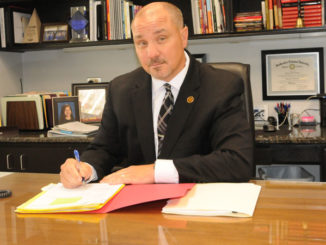
Local representatives say inventory tax survived, but it’s under study
Although St. Charles Parish delayed an effort to kill the inventory tax in the special session, it joins every parish in sharing the hit coming with numerous bills passed to cut spending and raise taxes aimed at putting a fast fix on the state’s immediate $1 billion shortfall this fiscal year.
“We had a lot of challenges and we did a very decent job of making further cuts to programs where we could and raising the minimal amount of revenue to fill the deficit gap,” state Sen. Gary Smith Jr., D-Montz, said. “We take care of our people in the River Region so we did what we could to fill those gaps and holes, but none were filled completely.”Smith said one of the positive things that came out of the session was the use of temporary measures to raise revenue to cover an estimated $960 million budget shortfall from now to June 30.
“I tried to make sure the things we did do were temporary or have a minimal effect on our citizens and businesses,” he said. “State government is no where near out of difficult times for the future.”
State Rep. Greg Miller, R-Norco, agreed, saying these are only quick fixes knowing fiscal year 2016-17 will bring more cuts.
“It’s incomplete,” Miller said of the 27-day special session that ended last Wednesday (March 9). “We didn’t completely take care of everything. We’re still looking at $800 million (more in cuts) in my opinion. We’ll have to deal with that in the regular session, but it’ll have to be done in cuts or some money will have to fall out of the sky.”
Both calling them quick fixes, Smith and Miller voted for the penny hike in sales tax for 27 months, making Louisiana’s sales tax rate the highest in the nation. They also supported measures to raise taxes on tobacco, cigarettes, telecommunications, restored a vehicle rental tax and will start collecting sales tax at certain events at Louisiana domed stadiums and baseball facilities, as well as on online sales.
“The culmination of this session was a combination of cuts and temporary revenue raising measures to get us through these times where we are to try to give some relief and keep these programs going,” Smith said.
Calling Louisiana’s fiscal situation the worst he’s ever seen in his 16 years as a legislator and probably in the state’s history, Smith called the special session one of the most contentious he can recall in his political experience.
“There is so much confusion in Baton Rouge from the previous administration’s shell game,” he said of trying to balance the state budget at time when they’re learned revenue was substantially overstated and contributed to the session’s challenges.
Both Smith and Miller say long-term fixes requires long-term solutions for substantive state fiscal solvency.
As one of those alternatives, Smith wants to revisit the state’s numerous tax credits, rebates and exemptions of which many have been on the books for years without reevaluation.
“When we had money that was fine, but we don’t have money now,” he said of these measures costing the state $450 million a year and fast rising. “The state can’t afford to keep paying taxes for them so we have to figure out another route.”
The inventory tax on movable inventory such as oil, which generates more than $16 million a year for the parish and millions more for neighboring parishes in the River Region, is one of them. Smith said a committee is being named to find new revenue to supplement or replace the tax revenue.
The state also reimburses businesses that pay the tax through income tax, a rate that was reduced from 100 percent to 75 percent last year.
Overall, Miller called the situation the “perfect storm.”
With the state facing close to a $4 billion budget shortfall overall in the next two years, Miller said legislators are battling out devastating cuts to higher education, hospitals and TOPS on top of dealing with depressed oil prices, lower than expected sales tax collections, growing Medicaid costs and the state being upside town in tax credits tocorporations.“It’s like a category 5 storm that hit exactly the way we did not want it to hit,” Miller said.
Smith added the situation as made even more difficult with a new governor and numerous legislators new to leadership positions who were learning their roles and responsibilities.
One of the bright spots in the session was passing a flat income tax of 5.6 percent for businesses and almost passed a 3.8 percent flat tax for individuals.
“I think they’re bright spots because the citizens say they want reform and we need to reform how we do business in Louisiana,” Smith said. He expects to see the flat tax rate measure revisited for individuals because time ran out on getting the required constitutional amendment and super majority.
According to Miller, “We’re picking winners and losers, and we’re trying to get rid of that so we can push a lower tax rate and that will be our work for the next year to make this a more sustainable system in Louisiana.”
Both legislators also recounted emails received from constituents during the session.
While the number did not increase to Smith, he said the frustration expressed in them rose significantly based on state Treasurer John Kennedy’s comments to the publiccalling for spending cuts over tax increases.
“We will continue to look into his proposals, but I’ve yet to find where any of his proposals have any substance,” Smith said. “They are merely good sound bites, using facts from 2008 or 2009, and his proposal included a $1.3 billion revenue increase because he wanted us to take away a lot of exemptions we gave to businesses.”
Smith and Miller say many of Kennedy’s proposed cuts are to statutorily protected funds.
A frustrated Miller recounted the first email he got during the session asking him if legislators eliminated the tax break for Mardi Gras specialty items.
“I’m asking my constituents, who don’t have special exemptions, to pay a higher rate because someone wants a special rate for Mardi Gras throws,” he said. “It’s brutal on the people taking the cuts and brutal on the people paying these additional taxes. Nothing we did was any fun.
Anytime you make one little move to raise revenue or eliminate a deduction or tax exemption, it’s affecting someone.”




Be the first to comment